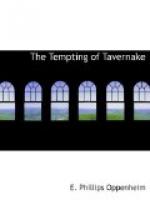Tavernake leaned forward towards Beatrice.
“I wonder,” he suggested, “whether you would not rather be alone with your father.”
She shook her head.
“You know so much,” she replied, “and it really doesn’t seem to matter. Tell me, father, how do you spend your time?”
“I must confess, dear,” the professor said, “that I have little to do. Your sister Elizabeth is quite generous.”
Beatrice sat back in her chair as though she had been struck.
“Father,” she exclaimed, “listen! You are living on that money! Doesn’t it seem terrible to you? Oh, how can you do it!”
The professor looked at his daughter with an expression of pained surprise.
“My dear,” he explained, “your sister Elizabeth has always been the moneyed one of the family. She has brains and I trust her. It is not for me to inquire as to the source of the comforts she provides for me. I feel myself entitled to receive them, and so I accept.”
“But, father,” she went on, “can’t you see—don’t you know that it’s his money—Wenham’s?”
“It is not a matter, this, my child,” the professor observed, sharply, “which we can discuss before strangers. Some day we will speak of it, you and L”
“Has he—been heard of?” she asked, in a whisper.
The professor frowned.
“A hot-tempered young man, my dear,” he declared uneasily, “a hot tempered young man, indeed. Elizabeth gives me to understand that it was just an ordinary quarrel and away he went.”
Beatrice was white to the lips.
“An ordinary quarrel!” she muttered.
She sat quite still. Tavernake unconsciously found himself watching her. There were things in her eyes which frightened him. It seemed as though she were looking out of the gay little restaurant, with its lights and music and air of comfort, out into some distant quarter of the world, some other and very different place. She was living through something which chilled her heart, something terrifying. Tavernake saw those things in her face and his eyes spelt them out mercilessly.
“Father,” she whispered, leaning towards him, “do you believe what you have just been saying to me?”
It was the professor’s turn to be disturbed. He concealed his discomfiture, however, with a gesture of annoyance.
“That is scarcely a proper question, Beatrice,” he answered sharply. “Ah,” he added, with more geniality, “the cocktails! My young friend Tavernake, I drink to our better acquaintance! You are English, as I can see, a real Britisher. Some day you must come out to our own great country—my daughter, of course, has told you that we are Americans. A great country, sir,—the greatest I have ever lived in—room to breathe, room to grow, room for a young man like you to plant his ambitions and watch them blossom. To our better acquaintance, Mr. Tavernake, and may we meet some day in the United States!”




